Following the 2022 World Juniors, Ottawa Senators general manager Pierre Dorion mentioned that several teams had asked about the team’s top prospects, namely Ridly Greig, Roby Jarventie, Jake Sanderson, and Shane Pinto. However, according to The Ottawa Sun’s Bruce Garrioch, he’s made it clear that he doesn’t want to trade any of those players.
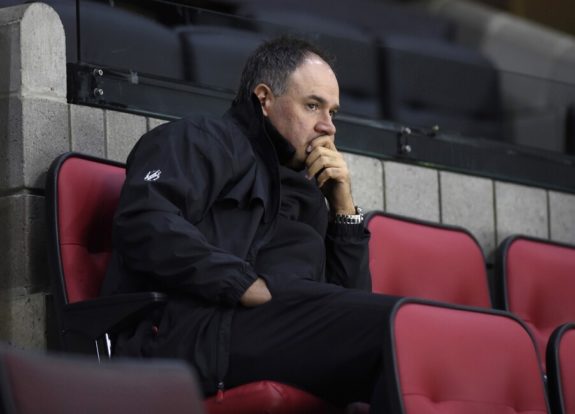
At first glance, that’s fantastic news for Senators fans. These players represent the future of the franchise and the results of a long, painful rebuild. There’s no way that they should be traded now, especially before the team can see them play at the highest level. However, it raises a follow-up question – who are they willing to trade? Although the team has vastly improved from last season, there are still some significant gaps in the lineup and questions remain as to whether they will be good enough to compete in a powerful Atlantic Division.
So, while it’s good that Dorion and company are sticking to their development plan, it does tie their hands somewhat in acquiring a top player to help fill out the last gaps in the roster. The Senators are finally entering the next stage of their rebuild in which they will begin transitioning from a patient approach to a win-now mentality. Even if no more moves occur before October, he is far from done on the trade market. So, if Ottawa’s top prospects aren’t going anywhere, who’s left to use as trade bait?
Nikita Zaitsev
It’s no secret that the Senators are trying to move on from Nikita Zaitsev’s awful contract, which puts them $4.5 million in the hole per season until 2024-25. It doesn’t help that he’s come nowhere close to repeating his rookie numbers of 36 points that he put up with the Maple Leafs; the closest he’s come was in 2020-21, where he scored 17 points in 55 games. Of course, it hasn’t helped that he’s played on some truly awful teams, but he certainly hasn’t helped much either. Declining offensive production and limited defensive impact have left him as an eyesore on the roster as a result.
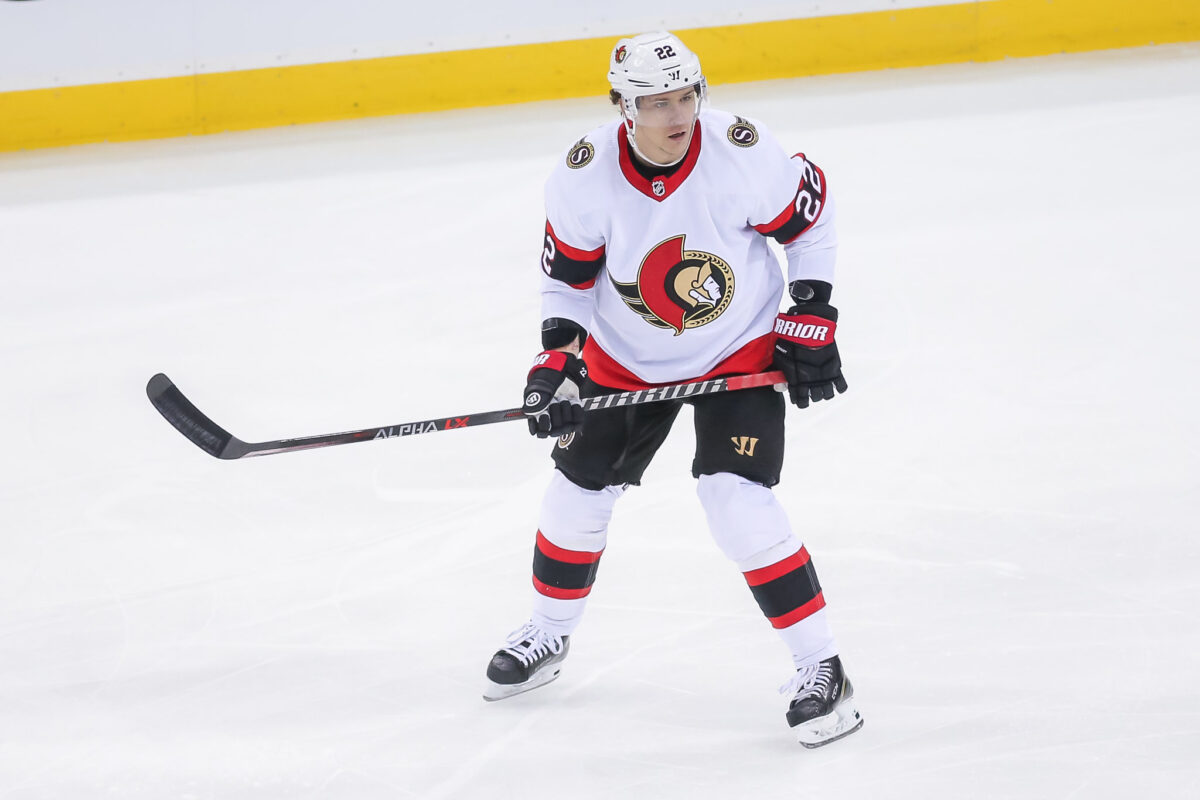
But that doesn’t mean he doesn’t have value. Recently, it was shared that he was attached to a potential deal with the Arizona Coyotes for defenceman Jakob Chychrun. The Senators have long been rumoured to be after him, but the asking price has been far too high. The recent report was no different, with the Coyotes asking for two first-round picks, a top prospect, and Zaitsev for their star defender. While the price for Chychrun may be lower without Zaitsev included, it’s unlikely to happen as the Senators need to move his cap hit to take on Chychrun’s $4.6 million per season. Even though Ottawa has more than enough cap space to take him on without moving money, shipping out Zaitsev’s contract will also free up space to re-sign Tim Stutzle and potentially Alex DeBrincat long-term.
It doesn’t seem the Senators are desperate to move Zaitsev unlike the situation with goalie Matt Murray, who was traded for future considerations to the Maple Leafs just days after the NHL Draft. Still, with his unsightly contract, poor performances, and several young players pushing to take his job, he may find himself on the move this season.
Erik Brannstrom
Speaking of defencemen, another blueliner who could find themselves on the move this season is 23-year-old Erik Brannstrom, who was originally a 15th overall selection in 2017 and acquired in the trade that sent Mark Stone to the Vegas Golden Knights. It’s fair to say that he has so far not lived up to the expectations he arrived under. Since joining the team in 2018-19, he has played 116 games and scored just two goals and 31 points, a far cry from the puck-moving two-way defenceman that was advertised after the trade. Injuries haven’t helped, but neither has his inconsistencies, which have forced the Senators to repeatedly send him down to the minors to find his game again.
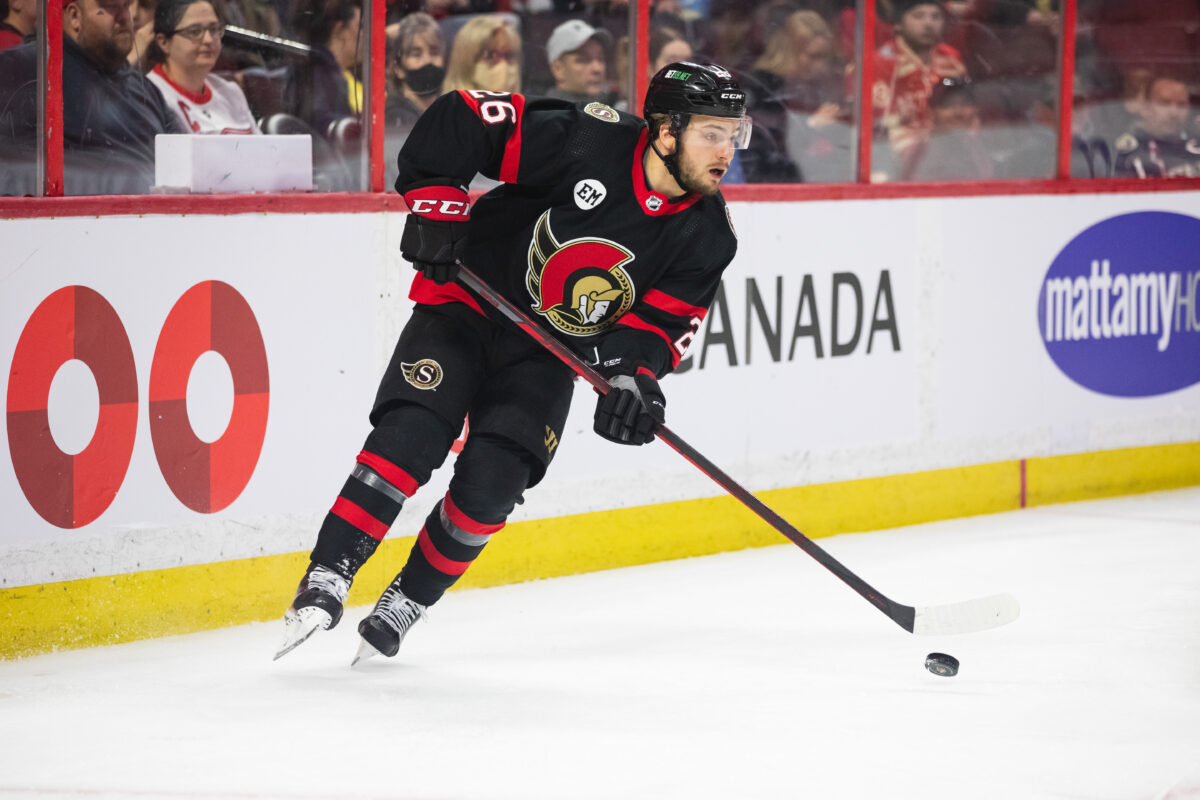
That’s not to say he’s not improving. Brannstrom played 53 games last season and put up a career-high 14 points and recorded his best possession stats. Defencemen often hit their stride later than forwards and the young Swede has yet to play in a full NHL season, which will arguably give management the best insight into the type of player he is and what he can be. But whether it will be enough is an entirely different question. The Senators need to find a way to limit high-danger shot attempts and figure out how to prevent Thomas Chabot from playing over 30 minutes a night for several games in a row.
So far, Brannstrom hasn’t been able to do that, and with him still needing a contract for 2022-23, there may be an opportunity to move him and find another young defenceman or forward who can address another area. There was some heat around a potential Filip Zadina trade back in January, as both players haven’t developed into the players that scouts thought they’d be when they were drafted. Ottawa is also in no rush to move such a promising young player, but for a potential change-of-scenery deal, such as one for disgruntled New York Rangers’ defenceman Nils Lundqvist, there may be the opportunity for both sides to win.
Tyler Boucher
Despite being selected 10th overall in 2021, Tyler Boucher is not among the Senators’ top prospects. That’s not to say he isn’t a skilled player; the young winger plays an incredibly physical game and has decent offensive instincts which could see him become a dominant bottom-six power forward. He is, as head scout Trent Mann argued, a player that helps you win games and not one that is easily acquired via trade. But Mann also admitted that Ottawa was thinking of future cap issues when they stepped up to the podium, not who would be the most skilled player.
Related: 5 Senators Prospects Who Could Crack the Roster in 2022-23
The juxtaposition of those two statements places Boucher in an interesting position for the Senators. On one hand, he projects to make the team better if he makes it to the NHL. Ottawa is developing into a tough, physical team with plenty of high-end skill, and adding another skilled depth player will only make them more intimidating and difficult to play against. Better yet, he will come cheaply, as it’s highly unlikely that he ends up on the second line.
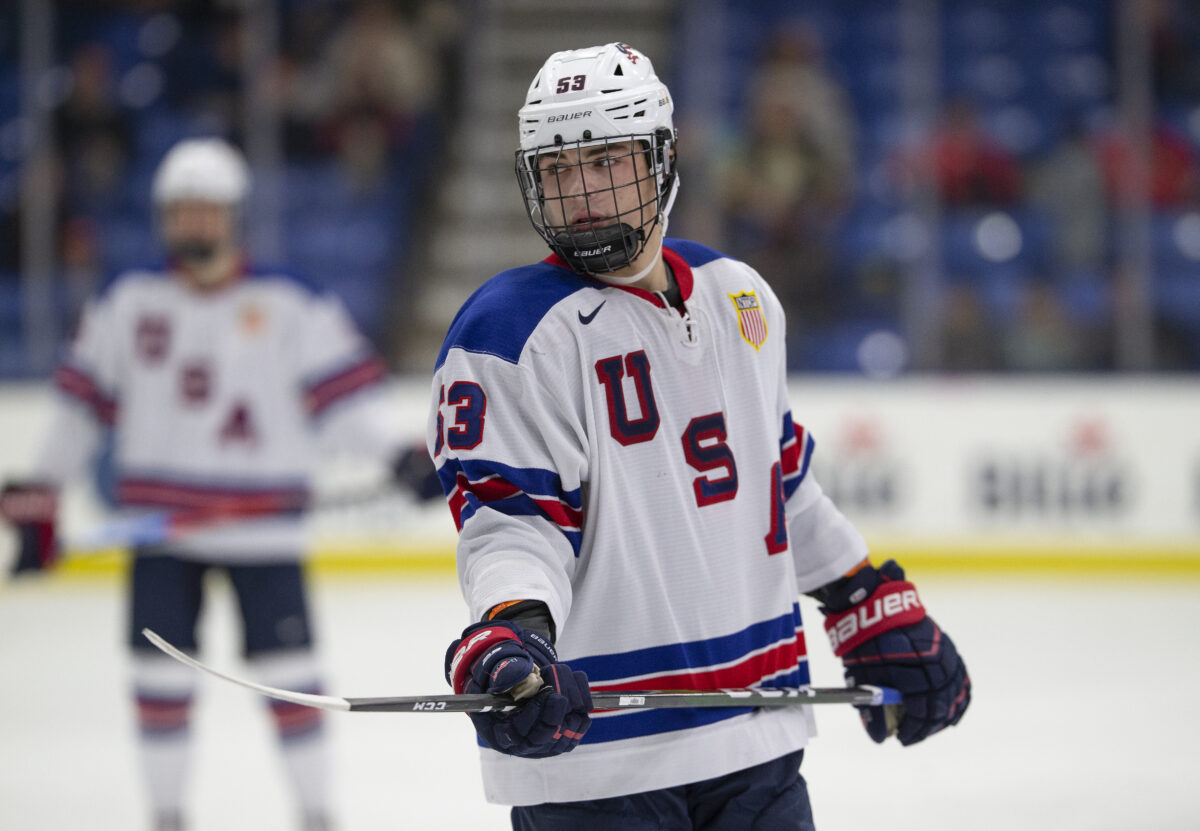
But on the other hand, Boucher is already on track to be overshadowed by more-skilled prospects in the system. Zach Ostapchuk, the Senators’ second-round in 2021, plays a similar game to Boucher but with a higher upside and better offensive skills. Mark Kastelic and Parker Kelly have less upside, but more experience and will likely be even cheaper than Boucher in the long term. Therefore, it’s possible that he becomes a trade chip this season, since many teams would love to have a talented physical contributor, and his upside is such that he could demand better players than either Brannstrom or Zaitsev. It’s a big gamble, of course, but with where the Senators are trending, it may be worth it.
Austin Watson
While Kelly and Kastelic are likely to take over the bottom six in the next season or two, they are still young and inexperienced, which has left that role to Austin Watson. A former first-round pick by the Nashville Predators in 2010, he never quite lived up to early expectations but established himself as a tough-as-nails winger who would do anything for his team. Struggles with alcohol abuse derailed his career for several years, but he’s had a resurgence with the Senators, putting up one of the highest point totals of his career last season and the second-highest point-per-game pace in 2020-21.
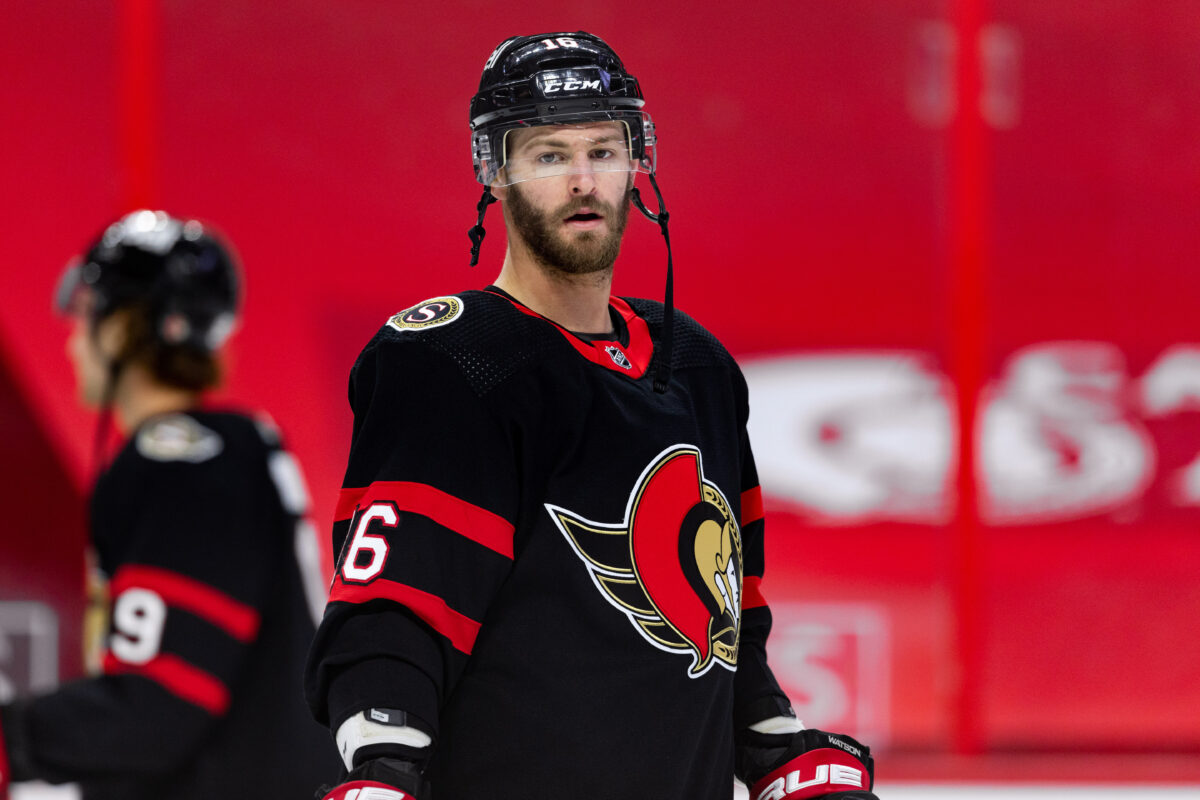
Watson’s honesty on and off the ice has made him a fan favourite in Ottawa, but at 30 years old and on an expiring deal, his days may be numbered in Canada’s capital. Like Boucher, he’s a player that could fetch a decent price at the trade deadline, especially for a team looking to go deep into the playoffs. Look at what the Tampa Bay Lightning paid for Brandon Hagel, Barclay Goodrow, or Blake Coleman, all of whom are role players who were never intended to play top-six minutes. Yet they paid a premium for those players, and it resulted in back-to-back Stanley Cups. Since the Senators aren’t there yet and they have plenty of options to replace Watson, it would not be surprising to see him moved at the deadline.
Artem Zub
Would Ottawa trade their diamond-in-the-rough signing simply to avoid extending him long-term? Before this season, many would have assumed that Artem Zub would have been moved before signing a long-term contract to save money, but after acquiring DeBrincat and signing Giroux, it seems much more likely that they keep him around. He has, after all, been one of the Senators’ best defensive presences and one of the few players able to hold down the fort that isn’t named Chabot.
Yet there is a possibility the Senators will have to move Zub anyway, depending on how the team’s contracts play out over the next several months. Murray Pam reported that the Senators are looking to be a cap team for the next several seasons, which is no surprise when looking at their recent acquisitions. But Ottawa still needs to re-sign Brannstrom (if he’s not moved first) and Alex Formenton before this season and will need to look at re-signing Debrincat, Kastelic, Jacob Bernard-Docker, Egor Sokolov, and most important of all, Stutzle.
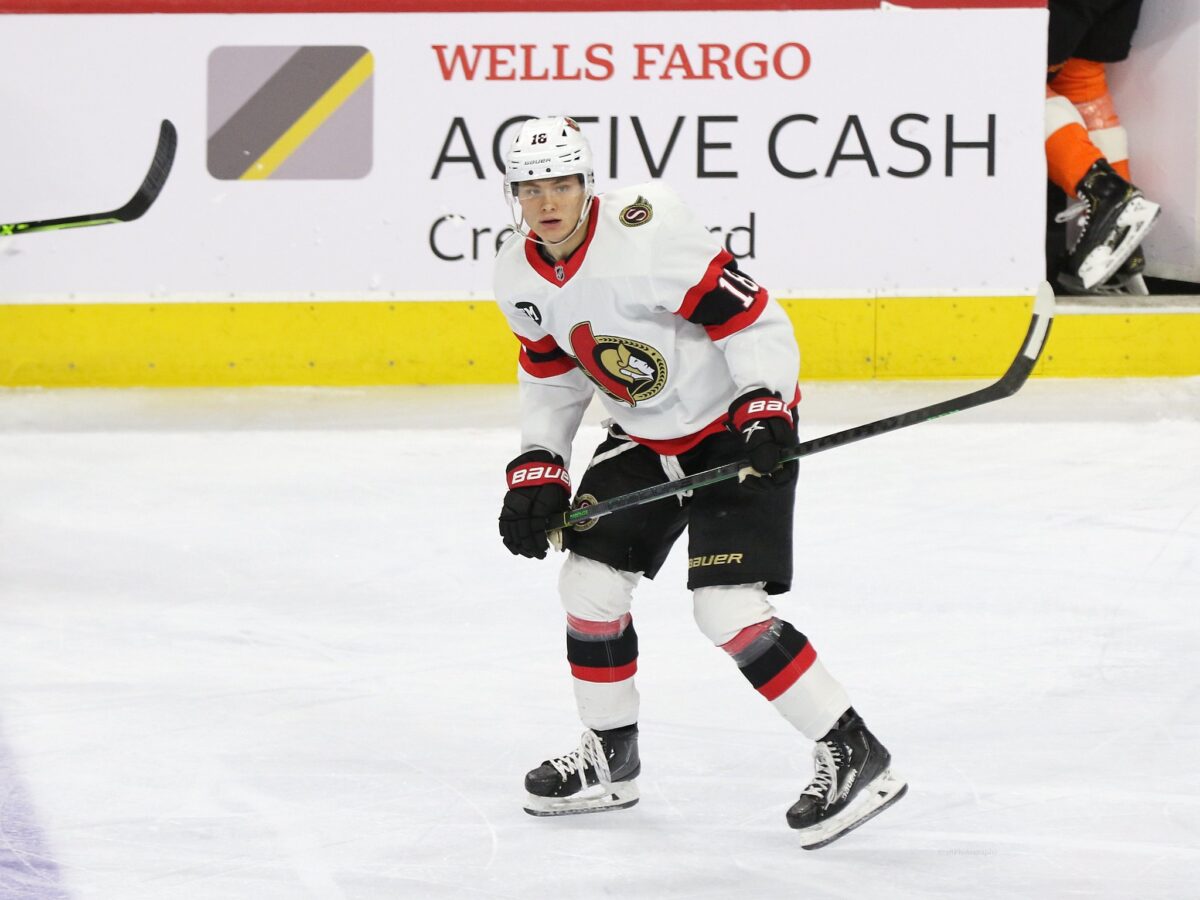
Stutzle will command the highest price, but how high will that be? Based on the Senators’ other recent young player signings, he likely will command around $8 million per season, which is what both Brady Tkachuk and Josh Norris currently earn. That seems to be close to market value, too; Andrei Svechnikov signed an eight-year, $62 million extension at the end of 2020-21 that puts him at a $7.75 million average annual value (AAV). Expectations are certainly comparable between him and Stutzle, so the contract should be, too.
However, if Stutzle signs for roughly $8 million AAV, then the Senators will suddenly be right near the top of the salary cap. Even if they can shed enough to bring back DeBrincat through shedding Zaitsev’s $4.5 million AAV and finding cheaper replacements for Travis Hamonic, Nick Holden, and Cam Talbot, that still leaves little room for Zub, who likely asks for $4 million AAV at the very least. It’s not an optimal possibility, but it seems somewhat realistic if the cap fails to raise by more than $1 million next season. If that’s the case, then it would be best if Ottawa can get something for him rather than let him walk for nothing.
Plenty of Potential For Improvement
Acquiring top talent is significantly more difficult if a team is unwilling to move a top prospect, but the Senators have already proven that it can be done. Dorion showed he can be a shrewd negotiator and get what he wants for the price he’s willing to pay, so if he says the young players aren’t moving, fans can likely take that at face value.
It’s also possible that the team fans see today will look very different in a year or two. The plan will be to support the core of Tkachuk, Norris, Batherson, Chabot, and Stutzle, and that will mean a rotating cast of role players will come and go as the team develops and gets closer and closer to fighting for the Stanley Cup. It may take some creativity to find the right mix, but Dorion isn’t afraid to be patient or aggressive when the situation calls for it. The team is in good hands, even if a fan favourite ends up being shipped off.